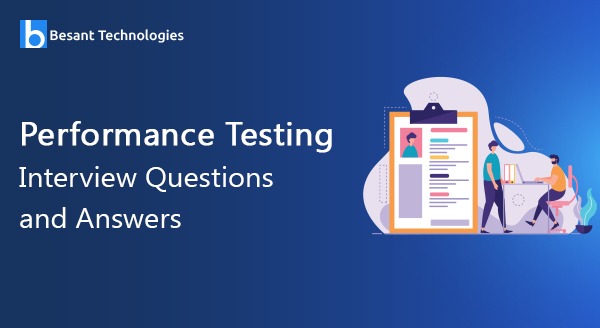Performance Testing Interview Questions and answers
Performance Testing Interview Questions and answers for beginners and experts. List of frequently asked Performance Testing Interview Questions with answers by Besant Technologies. We hope these Performance Testing Interview Questions and answers are useful and will help you to get the best job in the networking industry. This Performance Testing Interview Questions and answers are prepared by Performance Testing Professionals based on MNC Companies expectation. Stay tuned we will update New Performance Testing Interview questions with Answers Frequently.
Best Performance Testing Interview Questions and answers
Besant Technologies supports the students by providing Performance Testing Interview Questions and answers for the job placements and job purposes. Performance Testing is the leading important course in the present situation because more job openings and the high salary pay for this Performance Testing and more related jobs.
Performance Testing Interview Questions and answers for the job placements
Here is the list of most frequently asked Performance Testing Interview Questions and answers in technical interviews. These questions and answers are suitable for both freshers and experienced professionals at any level. The questions are for intermediate to somewhat advanced Performance Testing professionals, but even if you are just a beginner or fresher you should be able to understand the answers and explanations here we give.
Q1) What is Performance Testing?
A type of testing that ensures the Stability, Swift Response, and Reliability under different replicated real time events.
Q2) What are the types of Performance Testing?
Load test: To determine the performance of the application under normal load conditions
Stress test: To find the breaking point of an application under continuously increasing load.
Endurance testing: To find out the behaviour of applications for the prolonged duration and to find any memory leakages. It is also called as Soak Test. Typically a load test will be carried out of a minimum of 24 hours.
It is also called as Scalability Testing. Any new application will be tested to find out its capacity.
Spike Test: To identify performance bottle necks.
Q3) Name few Performance Testing Tools.
Silk Performer, QALoad, WebLoad, LoadRunner, Rational Performance Tester, JMeter
Q4) Give an outline of the Performance Testing Process.
- Requirement Gathering
- Test Planning
- Designing and Developing Scripts
- Creating the Scenario
- Executing the Load Test
- Results Analysis
- Publishing the results
- Approval of results by Client.
Q5) What is NFR?
NFR is called as Non Functional Requirements. Anything that is measured apart from the functionality comes under this category.
Q6) What are the different types of NFR metrics that need to be measured during Load Test?
- Transaction Response Time
- Throughput
- CPU and Memory % Utilization
- Errors if any.
Q7) What is BVM?
BVM is also called Business Volume Metrics. It is nothing but the Load Profile that is captured in the live environment. Basing on this BVM, we will design our Load Test.
Q8) What is a Performance Bottleneck?
Performance bottleneck is a result of a sudden spike in the load. the state of a computing device in which one component is unable to keep pace with the rest of the system, thus slowing the overall performance of the system.
Q9) Explain the fashion of a typical Load Test.
A typical Load Test will have three states. Rump up period in which the load is increased. A steady state where the Load remains constant. Ramp down period to gradually decrease the load on the system.
Q10) What is response time?
The time taken by the system to respond to the action initiated by the user is called Response Time.
Q11) What is Throughput?
The transactions processed in a unit time is called Throughput. It is also referred to as TPS.
Q12) What is Distributed Loading?
In distributed load testing test cases are executed to determine the application behavior.
Now application behavior is monitored, recorded and analyzed when multiple users concurrently use the system.
Q13) What is Protocol?
The process of executing pre-defined instructions in order to make two systems interact or information exchange is defined as protocol.
Q14) What is Performance Engineering?
Performance engineering is the process where we address the issues related to performance testing and rectify them.
Q15) What is SLA?
SLA is nothing but the Service Level Agreement that is set by the client or product owners for the NFR metrics.
Q16)What is User base?” open=”no” style=”default” icon=”plus” anchor=”” class=””]
The total number of potential users that might use an application is called User Base. It includes Active, Inactive and Offline Users.
Q17) Why Application becomes slow?
When multiple users are using the application at the same time, the load increases. As a result, the application becomes slow.


